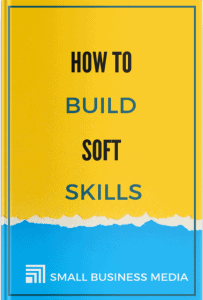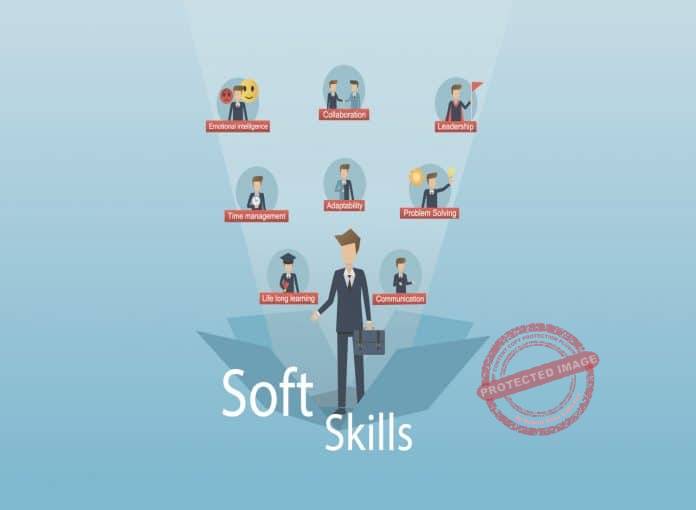Having a set of soft skills will help you excel and stand out in any workplace, hence, the need to build relevant soft skills constantly.
Stay put if you’re unsure how to build the relevant soft skills you need to excel in your professional journey.
This blog post gives insight into the practical steps you can take to acquire soft skills and be the best you can be in your chosen field.
Before we proceed on identifying and how to build soft skills, let’s find out the meaning of soft skills.
What is The Meaning of Soft Skills
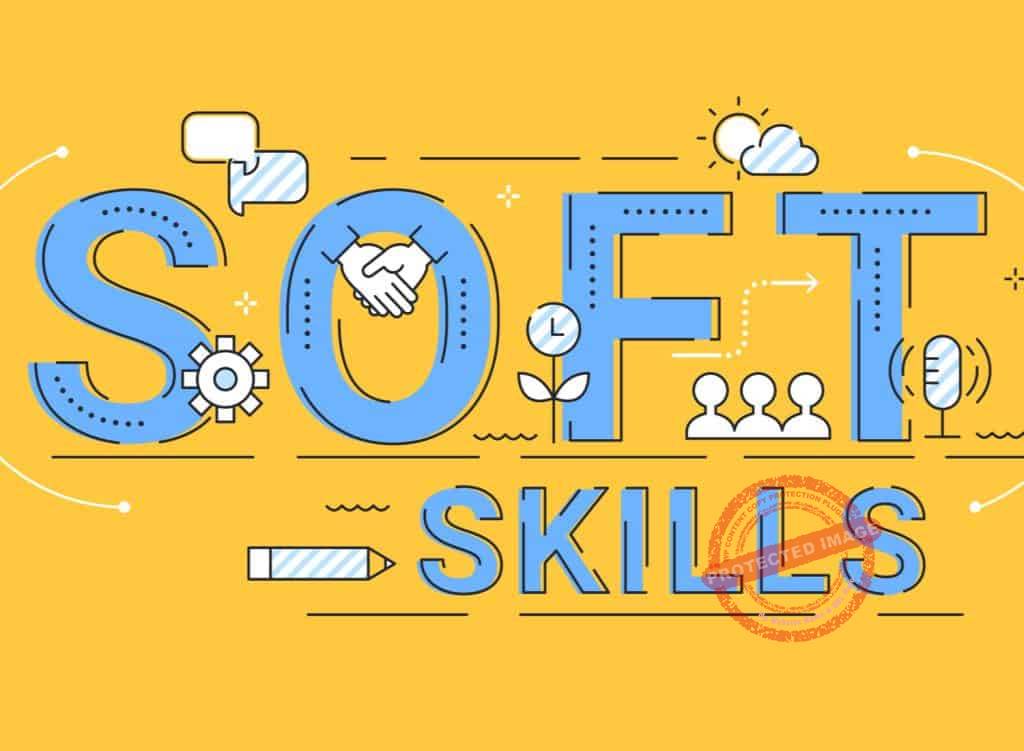
Soft skills are personality behaviors or attributes that allow an individual to communicate and work effectively.
Soft skills can be non-technical abilities, e.g., team spirit, effective communication, and time management.
These skills are naturally inherent in some individuals, while it needs to be developed by others.
On the other hand, hard skills are technical skills, e.g., engineering, coding, web development, content writing, etc.
The difference between these two is that you need to learn and develop hard skills.
Whereas soft skills are mostly inherent in some individuals, others need to learn them through education and practice.
Defining hard skills is easy, but we can’t say the same for soft skills
Furthermore, it is easier to measure hard skills compared to soft skills.
However, this does not make soft skills less critical.
On the contrary, soft skills play a major role in the employment process, as no employer is ready to hire anyone who will act like a robot in an organization or firm.
Instead, an employer will employ someone who can positively influence the company’s culture, know what clients want, and then act on it accordingly.
With that said, can you identify your soft skills?
If your answer is ‘No,’ then let’s show you how you can do so…
Identifying Soft Skills
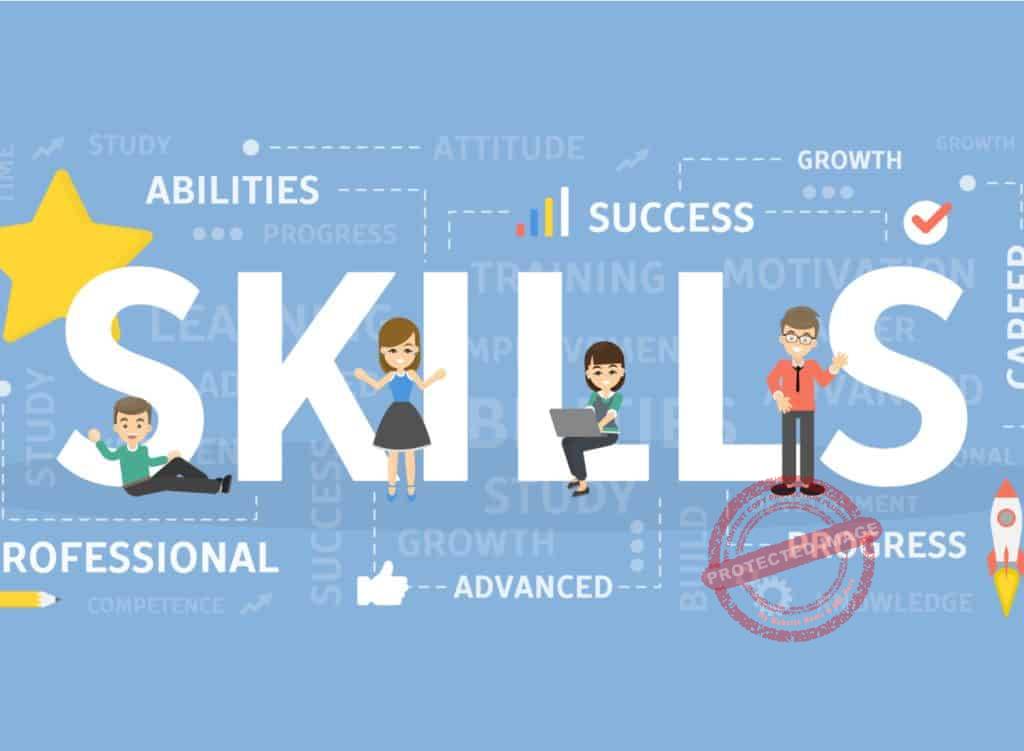
Before you begin to build soft skills, you must first identify which ones you have.
For example, if you worked with a team at one point or the other in your life, were you a good team player?
If you weren’t, you could easily identify that teamwork is not one of your soft skills.
To identify your skills, you have to start by looking inward.
One way of doing this is to become aware of your strong points.
This will then allow you to improve those strengths you’ve identified.
When you can do this, then you will be able to leverage your strength.
Thereby allowing you to work on your weakness.
Another way to identify your soft skills is through friends, family, and colleagues.
This set of people can help you identify your soft skills because they know what you are good at.
Hence, identifying your soft skills is not something you can do alone.
The people mentioned above can even give instances when those skills came into play and how well you used them.
There are times you feel that you are not organized, but people keep telling you the opposite.
In such a case, you need to reconsider how you feel about your organizational skills and work on them since others believe you possess this skill.
Examples of Soft Skills
Below are some soft skills that will come in handy in any organization or environment you find yourself:
- Leadership
- Time management
- Creativity
- Adaptability
- Delegation
- Problem-solving
- Teamwork
- Work ethic
- Listening
- Ability to work under pressure
- Communication, etc.
Which of the above can you identify as skills that you possess?
Soft Skills Categories – How to Build Soft Skills

Communication Skills
Effective communication is essential no matter the kind of job you find yourself doing.
If you can effectively communicate and your listeners understand, then you are blessed with a great benefit.
The soft skills that fall under this category are:
Listening – Here, you have to listen attentively, understand, and relate to other people’s views.
Speaking – You are to speak to an audience or an individual; give speeches that are impactful.
You have to be sure that your listeners are following and understand the message you are passing across.
Persuading – Convincing others to agree with a new perspective.
Selling – Offering exciting reasons for accepting any action or service.
Leadership
Employers want employees with leadership qualities.
Leadership qualities are needed at every position, not just in management positions.
Examples of soft skills under leadership are:
Commitment – Dedicating time, resources, and energy to any project that is assigned to you.
Motivation – Inspiring workers or colleagues to work and achieve their potential goals.
Trustworthiness – Following each promise made with truthfulness.
It also involves making sure that you will not make promises that you will not fulfill.
Setting goals – Building ambitious and realistic goals.
These could be short, medium, or long-term goals.
Time Management
Qualification is not essential if you cannot complete simple tasks.
That is why time management is an important skill to possess.
Working hard and finishing the task on or before the deadline will give you a better chance of being promoted.
Soft skills that fall under this category include:
Punctuality – Showing up early at all times.
Productivity – Giving attention to work to accomplish the task.
Organization – Creating and maintaining a more systematic approach for storing things and placement.
Planning – The use of arranged steps to achieve set goals

Problem-Solving
Thinking out of the box is essential if you want to be a problem solver.
If you can do the above, then you are good at thinking critically.
This is a major plus as it allows you to become indispensable in your organization.
The soft skills here include:
Critical thinking – The process of developing and using a structured method to take care of a task.
Innovation – This deals with coming up with new or original ideas or products, and services.
Creativity – Using new methods to deal with any problem.
Analysis – Giving better interpretation to data.
Collaboration
People make up any business.
Having a cordial working relationship with colleagues in an organization is very important in team building.
This is because working as a team helps in getting more work done.
The examples of soft skills in this category are:
Social skills – This deals with being able to relate with people in a friendly and welcoming manner.
Teamwork – Having a productive working experience with others.
Great personality – The ability to inspire people with a positive approach or character.
Conflict resolution – This skill allows you to resolve disagreements or issues between others confidently.
Having explained the different soft skills and their various categories, let’s move to the crux of this discussion; building soft skills.
How to Build Soft Skills

At this point, you might have identified the soft skills you possess and the ones you lack.
The fact that you possess several skills doesn’t mean there is no room for improvement.
Likewise, the fact that you lack some skills or aren’t doing well as far as they are concerned doesn’t mean you shouldn’t even try.
Hence, here are some ways to build soft skills.
Place Priority on the Skills to Build
Before you begin to build soft skills, you need to know the soft skills that you lack.
As we earlier mentioned, other people will be the ones to help you pinpoint the skills you possess.
Their response will help you know which skills lack and hence need to build.
The 10 most preferred soft skills in any organization are:
- Adaptability (leadership)
- Communication
- Teamwork (collaboration)
- Friendly personality (collaboration)
- Creativity (problem-solving)
- Social skills (collaboration)
- Punctuality (time management)
- Organization (time management)
- Critical thinking (problem-solving)
- Interpersonal communication
Decide on the skills you want to build and set out a time to do that.

Devote Time for Skill Building
In the same way, you take time to acquire hard skills; learning soft skills shouldn’t be an exception.
Constant dedication to building your skills will make you master those skills in no time.
Hence, you should dedicate time to build your soft skills.
You can achieve this by taking out 10 minutes or more per day to work on and build up your skills.
Doing that every day will go a long way to help you achieve your goals before the week or month’s end.
Learn/Study Relevant Resources on the Soft Skills You Want to Build
You can study different resources to build up your soft skills.
We are no longer in an era where learning is only achievable through textbooks.
Books are still important, though.
However, these days, with the invention of technology, we can study from the comfort of our homes and research on any topic of our choice.
Hence, here are some helpful resources you can study to help you build soft skills.
Blog Articles
You can get many blog posts just like this one you are reading on any topic of your choice with helpful information concerning the specific soft skills you want to build.
Consequently, educating you on how to build soft skills.
Podcasts
You can also find podcasts on the topics you want to learn about.
On some podcasts, you will find speakers that can provide you with the information and the understanding you need.
They can also analyze the topics very well, and you will be opportune to find relevant information from the host.
Online videos
Another source is online videos.
Watching online videos will help you to see some of these skills on display.
You can get videos on Vimeo, YouTube, and the rest of those sites.
There are coaches on these video sites, and through watching these videos, you will be able to study by observing what the instructors are doing.
There are also some resources you can pay for to get more information, such as:
Books
This is an old way of acquiring knowledge, but it still provides enough knowledge on topics you want to learn.
What you need to do is look for recent publications on the topics you need information on.
Study them well, and you are sure to get what you are looking for.
Curated Content – How To Build Soft Skills
Here, some experts will guide you on building soft skills.
However, you have to subscribe to their newsletters or be a member on their platform to get what you want here, so you can keep getting new topics that will help develop your skills.
However, this depends on the duration of your subscription or how long you remain a member.
Online courses – How To Build Soft Skills
Online courses have beginning and ending dates.
Hence, they are not like curated content where you are the one who decides to stay or leave.
Lessons on online classes are typically broken down differently for better understanding.
Some come with videos for a particular skill.
Above all, online courses can help you build your soft skills in more ways than you can imagine.

Practice – How To Build Soft Skills
Irrespective of any skills you need to build, you have to practice the newly acquired knowledge.
For effective practice, you should keep the following in mind:
Practice with a Purpose
You should have a specific area you are practicing on.
Practice more on your weak areas.
For instance, if you find speaking to a large crowd difficult, you should start speaking to a smaller group of people.
When you keep doing this, you will have learned to overcome that weakness, and before you know it, you will find yourself talking to a large crowd with ease.
Constant practice will make you do things you couldn’t have done before
Try new things
Find something to do, something thing that can challenge your understanding.
Something new and exciting as the case may be.
Experiment with new data.
Repeat these things over and over again.
Stay engaged
When you are practicing, you have to remain engaged; don’t lose interest while you practice.
Losing interest during practice can make you forget what you have already learned.
In such a case, you then end up wasting valuable time.
Ask for strong feedback
Your soft skills need to be reviewed or assessed from time to time.
You need to find someone who can assess you and determine your progress rate for this to happen.
The feedback you get will let you know if you’re making progress or not.
Your mentor can be the one to assess and also give feedback on how your soft skills performance is.
In all, there will be lots of improvement when you practice your skills.
Importance of Soft Skills in your Work Place

Soft skills are essential in workplaces.
Organizations have seen that any employee who lacks soft skills cannot bring growth to the organization.
Because of this, during interviews, they lookout for individuals who will not just come into the organization to waste time and resources but will be an asset to the workforce.
The following are the importance of soft skills in your workplace:
Helps you to Manage Time
One of the importance of this skill in the workplace is time management.
It is essential that the employee can deal with specific tasks on or before the deadline.
Time management includes punctuality, planning, productivity, and organization.
When you have the habit of being punctual to work, it gives you the time to settle in properly and take care of the day’s activity.
Helps you to be organized – How To Build Soft Skills
Your ability to handle every single task that comes your way is essential.
The organization helps you handle every task in an organized and systematic manner.
Improves Your Overall Productivity
When soft skills are properly harnessed in a workplace, it will help you to improve your overall productivity.
It helps to give you an edge and makes you outstanding in whatsoever you do.
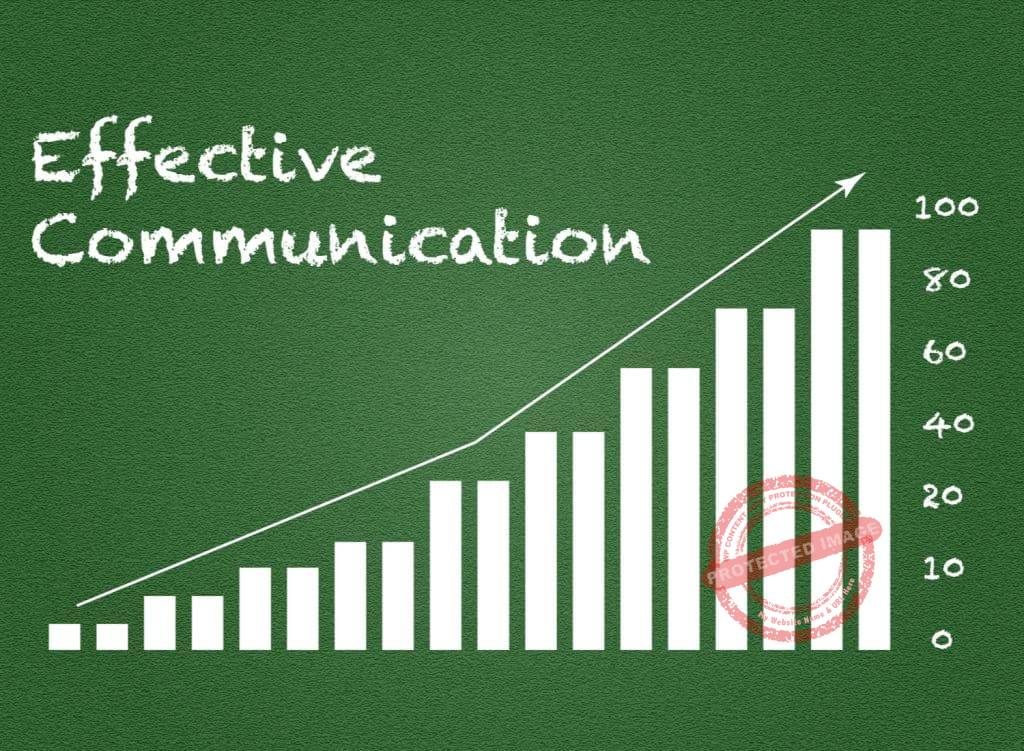
Enables Effective Communication
Another important skill employers lookout for is communication skills.
In this area, they need you to listen to clients and know what they want.
Communication is effective when the client understands the message passed across.
It is essential to communicate well in your workplace; this will make clients ask for your help when they have any issues.
Furthermore, you will be able to interact better with your colleagues and even your superiors.
Enhances your Leadership Quality
Leadership quality is another skill that is very important and needed in a workplace.
You don’t need to necessarily be a part of the management team to have this skill at your workplace.
You can be asked to lead a team for a project, which is when this leadership quality comes in handy.
Aids you in Solving Problems
It is also essential to think critically and solve problems because the client will usually have some complaints, and you have no other choice but to solve them.
This requires that you think critically, be innovative and creative to give solutions to their problem.
So, solving clients’ problems is very important in the workplace.
This will assure the clients that their needs can be met.
Enables you to Collaborate Effectively (Team Work)
Teamwork is also essential in a workplace.
Most projects need lots of hands to be able to reach the deadline and finish it efficiently.
When you have excellent team spirit, fitting into any team and achieving results will be much easier.
Conclusion on How to Build Soft Skills

Soft skills go a long way in the development of an individual and their career growth.
Hence, we have shared with you all the need-to-know about soft skills.
We have also provided a guideline on identifying which ones you possess and how to build them as well.
Hence, put these tips to use and acquire the soft skills you desire to have.
Click on Buy Now For A PDF Version of This Blog Post
 |
